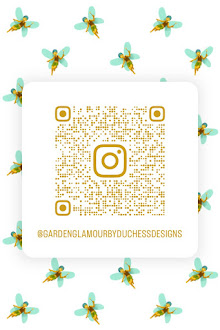Written by Garden Glamour reader and Contributing Writer, Emma Crosby.
Although we’re certainly living in an age of technological developments and
scientific advances, life for many is still incredibly difficult and stressful;
financial worries, employment problems, health issues and personal problems are
all common and can lead to isolation, depression and loneliness. Worse still,
it was recently reported that despite wanting to work, eighty per cent of
people with mental illness and substance abuse problems are
unemployed – a statistic that is both sad and worrying.
Dealing with such problems successfully
can be incredibly difficult, but international mental health charity MIND have
conducted a study which researched the effects of interacting with nature and
other people and the results are astoundingly positive. Officially titled
‘ecotherapy,’ the study reports that the process of spending time with other people out of
doors, either gardening, crafting or helping with conservation can help to ease
both physical and mental health issues.
The use of horticulture as treatment is certainly not a new thing, however;
the American Horticultural Therapy Association
(AHTA) have reported this method of treatment being used in ancient times, and
also mention the fact that it was both popular and successful in treating
injured veterans following the second world war. Centuries later,
the great outdoors continues to be a favored method in helping patients with
mental illness and substance abuse, and one of the main advantages is how easy
it is to incorporate it into other treatment programs.
Get involved with conservation
With the environment being such a huge current concern, one of the best
ways to get outside and get involved with nature is to join a local
conservation program; whether you’re interested in helping to clean up beaches,
repopulate wooded areas and forests or help to protect rare species of flora
and fauna, The Nature Conservancy can put you in
touch with a huge variety of projects which will get you out and about.
Covering all fifty states, they aim to connect individuals with the most
suitable ventures in their area; not only are the ecology benefits obviously
huge, but time spent outdoors with like-minded people is proven to be
advantageous to mental health.
Explore the possibilities in your own garden
The popularity of gardening and horticulture has exploded over the last few
years, with more people than ever before growing their own fruit, vegetables and flowers; from tiny urban
gardens on balconies and rooftops to ordinary back yards and acres of space,
everyone is getting in on the act.
If you’ve never attempted to grow anything before, don’t let that put you
off; start small with something simple such as tomatoes, strawberries or some
bee-friendly annuals such as cosmos, Californian poppies and the beginners favorite
-- the humble sunflower -- and just enjoy being outside and connecting with
nature. A good garden centre is the best place to start;
you’ll find staff are always keen to help aspiring gardeners and total novices,
and will point you in the right direction of everything you’ll need to get
growing.
Practice outdoor arts and crafts
Horticulture and nature aren’t the only natural treatments that have been
used in healing mental health issues, arts and crafts have also been well documented as
having a thoroughly positive effect on people who might be suffering with
anxieties and other problems; so it makes sense then that taking part in
outdoor crafts groups and attending arts festivals would be doubly
positive experiences. Learning a new skill can be absorbing and
interesting, and can easily be combined with a natural setting by simply taking
your project outdoors; cross-stitch, crochet and knitting are all really
portable crafts, and can be picked up as easily in the local park or nature
reserve as they can on the couch – surround yourself with fragrant flowers and
leafy green trees, and lose yourself in the great outdoors.
Join a Community Garden program
If you don’t have the space or the inclination to begin gardening on your
own, there’s always the option of joining a local community garden
project; one
space tended by several people, this kind of project combines sowing
and growing with interaction with others, and the benefits include fresh
produce to take home, an increased sense of community in the neighborhood and a
renewed connection with the natural world. Becoming involved in a group
gardening project can be an incredibly positive move; as well as being entitled
to a percentage of the fruit, vegetables or flowers, there are also the
environmental benefits to consider, and the social contact – mixing with other
keen gardeners not only helps to build new friendships, but also means you can
add to your horticulture skills by learning from those more experienced than
you.
True garden glamour…










Great post. Finding ideas to write about is one of the hardest things about running a blog. Please visit http://goo.gl/Gd5cNh
ReplyDelete